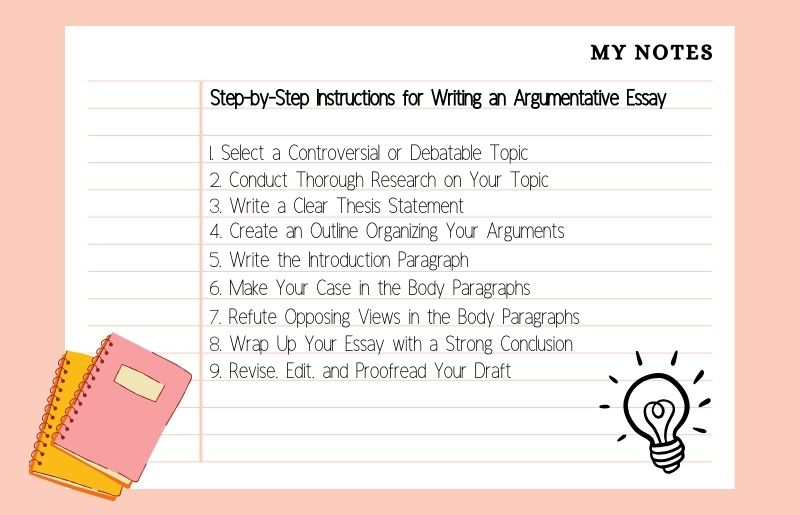An argumentative essay is a common assignment given to students to test their ability to take a stance on an issue and support it using logical reasoning and evidence.
This type of essay requires extensive research and evaluation of sources to construct a well-founded argument.
For those seeking assistance in navigating the complexities of this genre, the Canadian Writings custom writing service offers expert support in ensuring a well-reasoned and meticulously crafted argumentative essay.
The primary goal of an argumentative essay is to persuade readers to understand and potentially embrace or at least respect your perspective on a debatable topic. It does this by presenting facts, statistics, expert opinions, logical reasoning, and real-world examples that provide a solid backing for your thesis.
Additionally, a compelling argumentative essay will address opposing views and provide counterarguments along with evidence as to why those counterarguments are flawed.
Overall, an effective argumentative essay will demonstrate your ability to understand nuanced opinions on complex topics and make a strong case for why your stance is the correct one. This requires developing sharp critical thinking abilities and strong research and writing skills.
The Key Elements that Comprise an Effective Argumentative Essay

To successfully write an argumentative essay, several key elements must be included and executed well. These elements provide the necessary framework and support for building a persuasive argument. Without them, the essay will fail to convince readers of your viewpoint. Let’s explore these crucial elements:
A Clear, Concise Thesis Statement
Every good argumentative essay has a thesis statement that succinctly outlines the writer’s perspective on the topic. This serves as an overview of the entirety of the essay, preparing readers for the direction of the forthcoming arguments.
An effective thesis gives readers a straightforward understanding of the essay’s central argument while leaving room for details and nuance in the body paragraphs. A vague, ambiguous, or overly broad thesis will leave readers confused as to the essay’s purpose and direction.
For example, a strong thesis might read: “The phenomenon of gentrification has numerous negative consequences that outweigh any perceived benefits, leading to the displacement and cultural erasure of vulnerable communities.”
This provides a specific stance on a complex issue while alluding to expanded arguments to come.
Abundant, Reliable Supporting Evidence
The body of an argumentative essay provides the factual backing for the thesis statement.
Without ample evidence supporting the essay’s main argument, readers will not be convinced. That’s why writers need to conduct thorough research using credible sources to gather facts, examples, statistics, and expert opinions that substantiate the essay’s claims.
Addressing counterarguments is also pivotal, as it shows your willingness to engage with opposing views. Overall, you must provide empirical support if you want readers to accept your stance on a topic.
Logical Organization and Connections Between Ideas
An argumentative essay must lead readers through a coherent thought progression that flows naturally from one idea to the next. Effective transitions between sentences and paragraphs are key, as they connect the underlying logic between points.
The organization keeps arguments easy to follow. An introduction develops the background, a body presents evidence point-by-point, and a conclusion ties everything together. With strong organization and transitions, your reasoning is clear.
An Objective, Fair Tone Devoid of Bias or Emotion
Emotional language undermines the credibility of an argument by making it seem based in passion rather than facts. That’s why a neutral, reasonable tone is ideal for persuasive essays.
Avoid seeming overly invested in the topic and present your evidence objectively. By letting the facts speak for themselves, you come across as an impartial party simply seeking the truth rather than arguing from a biased perspective. A fair tone makes for more convincing arguments.
Step-by-Step Instructions for Writing an Argumentative Essay
Now let’s explore the process for crafting an argumentative essay from start to finish:
1. Select a Controversial or Debatable Topic
To give your essay a solid foundation, you must choose a topic that lends itself to arguments from both sides. It should be an issue that reasonable people can disagree on. This topic selection step is crucial, as the rest of the essay hinges on identifying a subject that fulfills this requirement.
2. Conduct Thorough Research on Your Topic
Once you select a suitable topic, the real work begins in gathering information from a wide array of credible sources. Seek out facts, statistics, case studies, expert opinions, and real-world examples that provide context around the issue. Make sure to look at all sides of the debate. Solid research is the bedrock of a well-founded argument.
3. Write a Clear Thesis Statement
With your research complete, crystallize your central claim or main perspective on the issue into a single sentence. This thesis statement will guide the entire essay, so ensure it is concise, clear, declarative, and on-topic. Place the thesis toward the end of your introduction paragraph.
4. Create an Outline Organizing Your Arguments

Before writing, map out an outline of your essay’s structure and main points. First, list your central arguments and counterarguments. Under each one, note the supporting evidence you will use. This organizational blueprint keeps your essay focused.
5. Write the Introduction Paragraph
Your intro grabs readers’ attention and provides background context for the issue. Present the specifics of the debate and summarize both sides at a high level. Close the intro paragraph with your thesis statement. Keep this section clear and focused.
6. Make Your Case in the Body Paragraphs
Use each body paragraph to present one key point of your argument. Start with a topic sentence introducing the paragraph’s focus. Then expand on that point using factual evidence, analysis, and logic. Cite sources to substantiate claims. Address counterarguments.
7. Refute Opposing Views in the Body Paragraphs
Don’t avoid counterarguments — address them directly using supporting evidence that disproves them. This strengthens your essay by diminishing opposing claims. For every point you make, a good refutation paragraph should follow.
8. Wrap Up Your Essay with a Strong Conclusion
Reiterate your thesis statement using different phrasing. Review your main points and overall argument. Close by explaining why your stance matters and the broader impacts. This ties the essay together neatly.
9. Revise, Edit, and Proofread Your Draft
Set your draft aside, then come back to it with fresh eyes. Tighten up arguments. Check for typos, grammar errors, and unclear phrasing. Ensure you have smooth transitions between ideas. Revise to refine the language and logic.
Why Argumentative Essays Are Beneficial Assignments?

Beyond being a common academic assignment, argumentative essays provide valuable skills that benefit students in school, careers, and life. Here are some of the key benefits this essay style offers:
- Sharpen Critical Thinking – Evaluating evidence objectively and crafting reasoned arguments strengthens thinking skills. This mindset is invaluable in school, work, and everyday decision-making.
- Gain Insight on Issues – Researching all sides of a topic allows you to deepen your understanding of complex problems from multiple standpoints. This fosters tolerance.
- Bolster Research Skills – Finding reputable sources, identifying key facts, and analyzing evidence carefully – these skills from writing argument essays make you a better researcher.
- Strengthen Communication Ability – Learning to write logically and persuasively bolsters important skills. You also must respectfully present views, even opposing ones.
- Provides an Intellectual Challenge – Formulating sound arguments requires diligence and rigor. Refining beliefs through careful analysis provides meaningful mental stimulation.
In summary, argumentative essays teach critical analysis, reasoned thinking, research skills, communication, and tolerance of divergent views – invaluable assets for students entering higher education or the modern workforce. The intellectual discipline needed to craft effective arguments is universally applicable. For this reason, argumentative essays empower those who master the form.
As a mentor, I share my knowledge with educators worldwide, believing in the power of collective wisdom to shape a better future.
My leadership has turned Talks With Teachers into a haven for educators to grow and celebrate their profession, truly embodying the organization’s pioneering and caring ethos.







